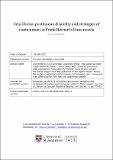Files in this item
Crip Gholas : posthuman disability and strategies of containment in Frank Herbert’s Dune novels
Item metadata
| dc.contributor.author | Simonetti, Nicola | |
| dc.date.accessioned | 2022-07-31T23:43:36Z | |
| dc.date.available | 2022-07-31T23:43:36Z | |
| dc.date.issued | 2022-02-01 | |
| dc.identifier | 276551972 | |
| dc.identifier | 6d3750b3-822b-42fe-9ae0-e2bc2a6d2f5d | |
| dc.identifier | 85135165581 | |
| dc.identifier.citation | Simonetti , N 2022 , ' Crip Gholas : posthuman disability and strategies of containment in Frank Herbert’s Dune novels ' , Journal of Literary & Cultural Disability Studies , vol. 16 , no. 1 , pp. 77–92 . https://doi.org/10.3828/jlcds.2022.5 | en |
| dc.identifier.issn | 1757-6466 | |
| dc.identifier.other | ORCID: /0000-0001-6405-0435/work/108119043 | |
| dc.identifier.uri | https://hdl.handle.net/10023/25756 | |
| dc.description.abstract | Michael Bérubé has recently argued that representations of disability in science fiction are almost ubiquitous but heavily underrecognized. The article builds on Bérubé’s remark to discuss the constructive effects of adding critical disability studies to the approaches that have focused on Frank Herbert’s Dune series. The argument is that a disability-informed reading of the character Duncan Idaho across all six original Dune novels exposes a range of ableist assumptions upon which the narrative relies. Genetically engineered, the reincarnations of Idaho might be read as implying posthuman possibility. In contrast, the article demonstrates the ways in which Herbert’s characterization of Idaho and the latter’s relationship to Dune’s society represent ableist ideologies. By discussing Idaho’s storyline and Dune’s ableist social constructions, the article highlights a series of narrative anxieties and strategies of containment that undermine any possible interpretation of Idaho’s disability as socially acceptable and limit the ways in which Herbert’s portrayal of Idaho may be used to imagine a positive presence of disabled people in future scenarios. | |
| dc.format.extent | 16 | |
| dc.format.extent | 263342 | |
| dc.language.iso | eng | |
| dc.relation.ispartof | Journal of Literary & Cultural Disability Studies | en |
| dc.subject | Posthumanism | en |
| dc.subject | Disability | en |
| dc.subject | HV Social pathology. Social and public welfare | en |
| dc.subject | PB Modern European Languages | en |
| dc.subject | PQ Romance literatures | en |
| dc.subject | T-NDAS | en |
| dc.subject | NIS | en |
| dc.subject | MCC | en |
| dc.subject.lcc | HV | en |
| dc.subject.lcc | PB | en |
| dc.subject.lcc | PQ | en |
| dc.title | Crip Gholas : posthuman disability and strategies of containment in Frank Herbert’s Dune novels | en |
| dc.type | Journal article | en |
| dc.contributor.institution | University of St Andrews. French | en |
| dc.identifier.doi | 10.3828/jlcds.2022.5 | |
| dc.description.status | Peer reviewed | en |
| dc.date.embargoedUntil | 2022-08-01 |
This item appears in the following Collection(s)
Items in the St Andrews Research Repository are protected by copyright, with all rights reserved, unless otherwise indicated.

